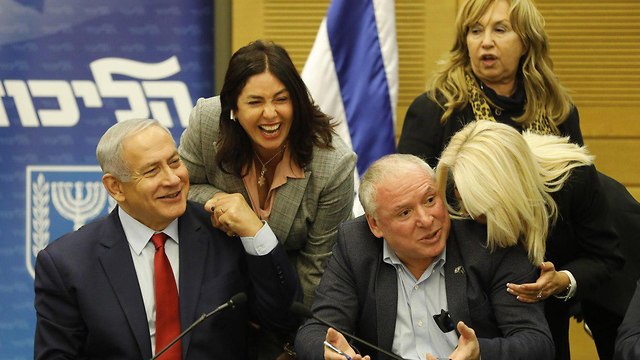
Israel holding elections for sake of Netanyahu's personal interests
Op-ed: Only a month ago the prime minister scolded Lieberman and Bennett for attempting to topple the coalition at a time when Israel found itself on the brink of war. But now, motivated mostly by his legal woes, he's decided to call early elections anyway
But let's not kid ourselves. The coalition heads were not the ones who decided to call early elections, as they claimed in an official statement, because they would have preferred to keep the current government alive for as long as possible. Finance Minister Moshe Kahlon of Kulanu even said that he will never be the one to topple a right-wing government. The order came from Netanyahu himself, because if he genuinely wanted to keep the coalition afloat, nothing would’ve stopped him and a solution to crisis triggered over the IDF draft bill would have been found overnight.
Someone must have convinced the prime minister that the elections should be held soon, before Attorney General Avichai Mandelblit publishes his decision on Netanyahu’s corruption investigation—which could potentially influence the prime minister's electorate.
The prime minister’s associates probably convinced him that Mandelblit, who they know well, wouldn’t dare release his recommendations a month before the elections, and after Netanyahu is once again elected as prime minister, Mandelblit will most likely not make his decision public right away. “Go for it. You are at your best when you’re the instigator,” his advisors probably told him.
Netanyahu’s advisors also most likely insisted that he shouldn't wait until former IDF chief of staff Benny Gantz establishes his own political party and starts fundraising.
It’s such a cynical move that it pains me to the bones. It’s been only a month since Netanyahu scolded Avigdor Lieberman for resigning from his post as defense minister and quitting the coalition along with his party Yisrael Beiteinu. It’s also only been a month since Netanyahu sabotaged attempts made by Education Minister Naftali Bennett and Justice Minister Ayelet Shaked from the Jewish Home to resign from the government, claiming that the complex security situation in the country would only deteriorate if the coalition collapsed.
Somehow, over the past month we’ve evolved from a country on a brink of war to a state that can easily afford to go to early elections—which are expensive and draining not only for the candidates but most importantly for Israeli citizens—only to end up with the exact same coalition we’ve had up until this point. As evidenced by Netanyahu's claims made on Monday, the current government is “the core” of the coalition we’ll have next year.
It’s no wonder the public doesn’t trust politicians, who prioritize their personal interests above the national ones. The issue that tipped the scale in calling early elections wasn’t the IDF operation to destroy terror tunnels constructed by Hezbollah along the Israel-Lebanon border or the ongoing wave of terror attacks in the West Bank, or even the volatile situation in the Gaza Strip.
It’s fascinating how the reality suddenly changes when personal interests are at stake. It’s an insult to the intelligence of the general public.
A few bulldozers did some digging on the northern border, the prime minister took some photos with some soldiers and the hard times are suddenly behind us, despite the fact that for the past month we’ve been feeling as though there is a permanent cloud over the nation’s heads—precisely because Netanyahu warned us just how dire the security situation is. This doesn’t give us the sense of security, you fool!
The coalition heads said in their statement on Monday the decision to call snap elections stems from “budgetary and national responsibility,” which is the exact description Netanyahu used a month ago to explain why the coalition should be preserved at all costs.
It’s nothing but a matter of personal interest. Finance Minister Moshe Kahlon wants elections before the public feels the pinch from the latest hikes in the cost of living. The ultra-Orthodox parties want elections in order for the new IDF draft law to completely collapse. Lieberman wants elections in order to salvage some seats before his popularity fades altogther. And Bennett wants to dissociate himself from the prime minister as fast as possible.
As for Netanyahu, who only a few days ago said he’s confident that his government will survive at least until the end of the year, is motivated mainly by his legal woes.
Netanyahu might have hesitated to call early elections last week due to Mandelblit’s announcement that his decision will not be made because of time constraints, or maybe it was due to the pressure the prime minister had to face at home. One thing is certain, those who hoped there will be a plea deal or resignation, will be left disappointed.
Netanyahu is here to stay, and we’ll see who has the courage to challenge him.












